#Roman law courts
Explore tagged Tumblr posts
Text
Rest in peace Cicero you would've loved twitter
#cicero's letters#marcus tullius cicero#roman classics#roman law courts#ancient rome#ancient roman#ancient history#politics of the late republic#late roman republic#roman republic#cicero#classical civilisation#classical history#cicero in verrem#in verrem#pro caelio#pro murena#cicero did not stop talking my boy would've dominated twitter fueds#rip cicero you wouldve loved twitter#romans#roman politics#cato the younger#julius caesar#pompey#crassus#publius clodius pulcher#verres#in catilinam#pro milone#tagamemnon
15 notes
·
View notes
Text
Provenance mysteries: Opera, quae exstant L. Annaei Seneca

This edition’s provenance mystery features a three volume set of the collected work of Seneca: Opera, quae exstant L. Annaei Senecae ; cum integris Justi Lipsii, J. Fred. Gronovii, & selectis variorum commentariis illustrata ; accedunt Liberti Fromondi in quæstionum naturalium libros & [apokolokuntosin] notæ & emendationes, printed by Daniel Elzevir in Amsterdam in 1672. It includes commentaries by the noted Dutch humanist Justus Lipsius and botanist Johannes Fredericus Gronovius amongst others.

As can be seen in the photograph, the book is bound in vellum over boards with a gold-tooled armorial crest on the front (and back) boards. The coat-of-arms has the motto ‘Honi soit qui mal y pense,’ part of the British royal motto, and also used by knights and ladies of the Order of the Garter. The coat-of-arms is probably easily identifiable by someone with the knowledge and skills, but remains a mystery to this writer. There is no other provenance information in the book itself, and no record of its acquisition by the Library.
The book was published during the period when Daniel Elzevir worked with his cousin Louis Elzevir in Amsterdam, printing and publishing a range of classical Latin texts in octavo format, such as this one. The gilt armorial stamp and vellum binding sets this book apart from many of the books in our collection, which tend to have undecorated calf bindings. Vellum and parchment bindings are commonly found in continental libraries, but their presence is not as common in seventeenth century English libraries. Vellum was an expensive material to use as well, suggesting that this was a high status item for its owner.
The book features in the Library’s current exhibition: Mapping the Early Modern Inns of Court. This exhibition highlights some of the areas that the ‘Mapping the Early Modern Inns of Court’ group has explored in seminars and publications: recreation (fencing, revelling, and gaming); literary culture at the Inns; religion and preaching; learning the law and verbal skills; travel and exploration endeavours. Barristers regarded Seneca as a model orator and lawyer, and they frequently studied, quoted, and translated his works. They were taught Senecan verse while still at school, and continued to study, and translate his works as adults.
As ever, if you recognise this armorial device or have further comments please get in touch: [email protected].
Renae Satterley
Librarian
August 2024
#library#law library#mtlibrary#inns of court#history#rare books#libraries#books & libraries#london#rarebook#roman literature#seneca#vellum
14 notes
·
View notes
Text
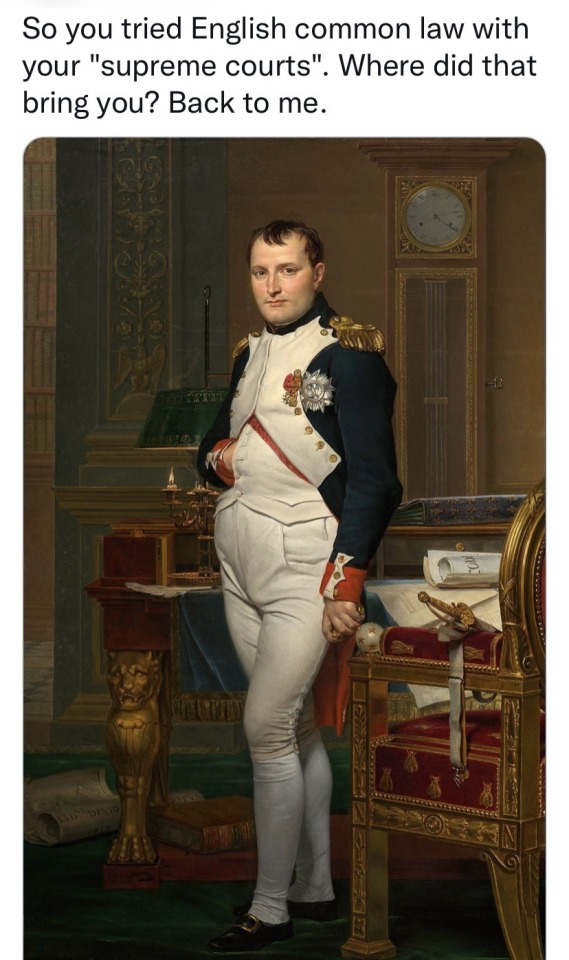
The great civil law vs common law debate lmfao
#civil law#common law#law#Napoleon#napoleon bonaparte#napoleonic code#history memes#history#Code Napoléon#napoleonic era#19th century#first french empire#napoleonic#french empire#France memes#English common law#Roman law#Europe#supreme court#Britain memes#British memes#humour#humor#funny#lol#frev#french revolution#la révolution française#napoleonic wars
19 notes
·
View notes
Note
What are your biggest turn-offs when reading/watching historical fiction or retellings of myths?
this is really complicated - i can put it in two boxes, both of which are packed very full.
disconnection from the material reality of the past
when characters display a very specifically modern mindset (about social issues especially, but other stuff too)
(I also get bothered by some kinds of modern language - I don't mind it when, idk, an author uses "sensible" with the modern connotation of "practical" and not the 18th century "emotional" or "empathetic", but "yeah" or "okay," or even, as i found out when someone used it in medieval fantasy, "holy shit" will get on my nerves.)
there are modern things where (made up example!) a character who's supposed to be a cook will talk about making caprese salad for a fancy restaurant in December, and someone snarking on the book will say "yeah, right, they should know better than to make something that depends on a fresh summer vegetable!" and even with greenhouses, that's pretty fair. and that's even more extreme in the past. it's 1650 in Verona, it's December, you cannot obtain fresh tomatoes. i don't think this means that people in the past were, necessarily, more emotionally or spiritually in tune with the cycle of the year, or the labor it took to get clothes, or furniture, or any other material item, and of course wealth can insulate people from some of that difficulty, but it does mean that the seasons had more direct impact on people's lives. It's possible to, for example, buy clothes ready-made, but for anything fancy, it's more likely that it'll be made to fit if it's new, or altered extensively and painstakingly if it's not. that means that tearing or staining a fancy dress isn't just an issue of looking bad - you can't just replace it, and you probably won't throw it out - you figure out how to reuse it. those concerns of access to material goods are just a lot closer to the surface of the world than they often are now.
my objections to modern attitudes about the world are not that people in the past 100% accepted the views of their contemporaries - there were always people who didn't, and it makes sense that a protagonist would be one of them. but people wouldn't phrase those objections in the same way that modern people would - say your main character doesn't want a woman accused of being a witch burned. "God's power is such that the Devil cannot give this woman the ability to sour milk" is most likely going to be more persuasive to the crowd than "witches aren't real." and sometimes that's rough - it's not super fun to read about a Roman with Roman attitudes about provincial wars, or slavery in the city, but I put something down because a Roman character said (in internal dialogue) that he was disgusted to see that a man had been tortured because "Romans simply didn't do that." Historical Romans did do that, routinely - a slave could not testify in a law court unless they had been tortured. Even with distasteful things like that, I'd much rather it just be glossed over than to have them say the "correct" modern thing. It just makes it feel too much like the theme park version of the culture.
Both of these are because of specific things I come to historical fiction for - I want that sense of alienation, the gulf of experience. I hate that most historical fiction (and fantasy set in semi-recognizable periods) characters don't really care about Honor, except as a joke, because I love when characters organize their lives around arcane rules and systems that cause tiny things to escalate into blood feud. I just think they're neat! I like it when people's worldviews are shaped by their lack of scientific certainty about what causes crops to fail! If I wanted to read about people who thought and acted like me, and had lives that were mostly similar to mine, only cooler, I'd just read contemporary fiction.
3K notes
·
View notes
Text
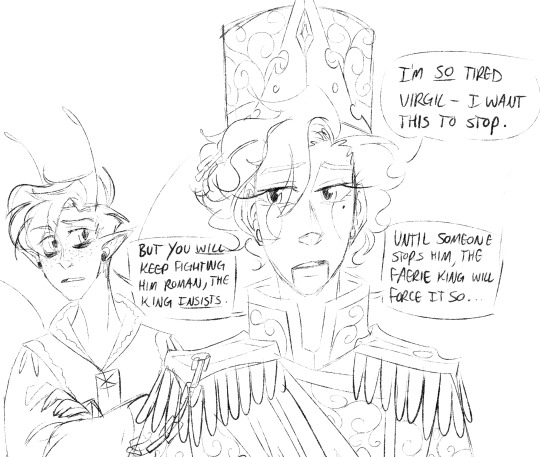

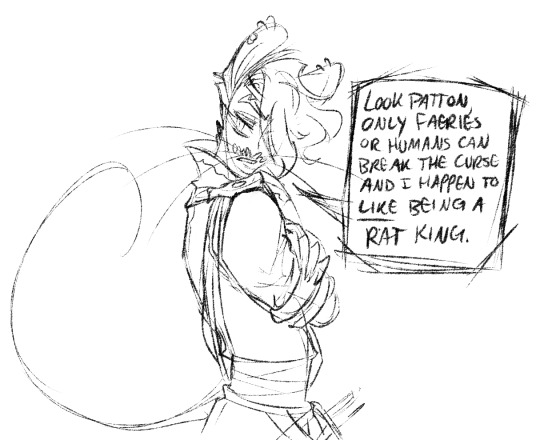


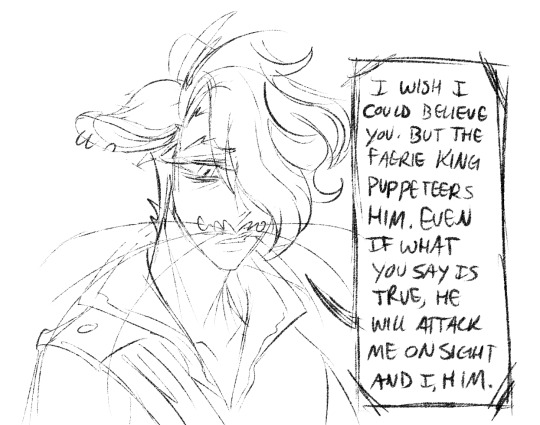


More Nutcracker AU!
Cast and explanations under the cut
Patton is our human (Clara's role) who was sent to the land of the Toys by Logan for the sake of breaking the princes' curses while they are trapped there.
Logan (not pictured, Drosselmeyer's role) was a member of the princes' court and fled to find someone who could help them. He transports himself and Patton to the land of Toys and is himself also a toy, cursed with the rest of their people once he returns.
Janus (not pictured) is the King of the Faeries, and the one who cursed the twins in order to punish the twins' father for stealing their magic sugarplum and causing the collapse of their whole world, leaving only Janus and Virgil to make it out of the magical carnage. He is angry and bitter. He regrets his decision but is too far lost to the bitterness and isolation of losing everything to reverse the spell. Perhaps a kind human can change his mind.
Roman was cursed to become leader of the dolls, turning him into the Nutcracker Prince, and he (like Remus) is puppeteered by Janus's curse so that when the twins see each other, they can't help but fight one another. Roman wants to stop fighting- he is exhausted and he's afraid if he fights too much he could kill Remus. The more he fights Remus, the more he is turned into an inanimate doll. Logan has a lot of trouble bringing him back to consciousness after a battle and it's getting harder and harder to do so.
Remus was cursed to become the Rat King, and unlike Roman he is flesh and blood and LOVES being King of the rats. He would stay this way if it weren't for fear that their fighting will get himself killed. Unlike Roman he is more and more flesh and blood rat by the day, and finds his mind wanders to less important things like food and digging through trash. He suspects the day his mind slips to his animal thoughts while fighting will be the day Roman kills him, and the day Roman becomes a fully non-sentient doll.
Virgil is the Sugarplum Faerie General to King Janus's court, and also his son. He has been acting as a go between secretly for the princes, but he cannot disobey his king according to faerie court law. The only interference he can manage is telling both sides the others' movements. He wants to help Patton break the spell.
547 notes
·
View notes
Text
[Under the Holy Roman Empire] the Habsburgs' biopolitics intruded harshly on Jewish family planning. According to the "Familiants Law," decreed in 1727 by Karl VI, the father of Maria Theresa, only the eldest son in each family could start his own family, and the number of lewish families allowed to live in Bohemia was frozen.
Every male Jew who did not have the rare special status of a "protected Jew" or "court Jew"—anyone who wanted to marry, have children, and bequeath something to these children—had to wait for a head of the family to die; a head of any family would do.
This is precisely what happened in Wosek (small southern Bohemian manor) in 1802. A Jew named Fischel died, and a few weeks after him his only child died in infancy. Because wives and widows could not be familiants, the spot would be assigned to someone else. A man named Josef Kafka was given the chance to purchase the right to reproduce as guaranteed by the state: Josef Kafka, the great-grandfather of the writer Franz Kafka.
— Kafka: The Early Years by Reiner Stach
1K notes
·
View notes
Text
Some Roman Art Vocabulary

for your next poem/story
Acanthus - a kind of Mediterranean plant with large spreading leaves. It was used as a decorative element on Corinthian capitals and also was a symbol of death.
Amphitheater - an elliptical structure with a central arena for the staging of gladiatorial contests and animal combats.
Apse - a semicircular space within a Roman building. Typically a basilica would have an apse at one end.
Arch - a curved architectural member that spans an opening.
Atrium - the central room of a Roman house. It had a hole in the ceiling and a pool in the center of the floor to catch rainwater.
Aureus - the most valuable Roman coin, made of gold.
Barrel vault - a semicircular ceiling over parallel walls.
Basilica - a building type used for law courts and conducting business, which usually stood in the town forum. It consisted of a long rectangular hall with an apse at one end and three aisles separated by columns. The central aisle had a raised ceiling and clerestory windows. Often the exterior of the building was colonnaded.
Cameo - a relief carved from a stone that has layers of different colors, such as sardonyx.
Capitolium - the main temple for civic worship in Rome and other cities. It was dedicated to the three chief gods, Jupiter, Juno, and Minerva.
Cardo - the name of the north-south street in a Roman town laid out on the grid system.
Cavea - the rounded space of a theater containing seats for the spectators.
Colonnade - a row of columns.
Columbarium - a type of communal building to hold ash urns of the cremated. The name comes from the structure’s resemblance to a dovecote, since the urns, as well as portrait busts, were placed in niches in the walls similar to the nesting spaces in such a birdhouse.
Column - a weight-bearing architectural member that has a base, a cylindrical shaft, and a capital (ornamental top).
Concrete - a building material made of small stones or rubble (aggregate), lime mortar, water, and volcanic sand (pozzolana).
Consuls - the two chief magistrates of the Roman state, elected annually.
Cubiculum - the bedroom of a Roman house.
Damnatio memoriae - a decree by the senate that condemned an emperor and ordered that all images of him and references to him be obliterated.
Decumanus - the principal east-west street of a Roman town laid out on the grid system.
Source ⚜ More: Word Lists
#roman art#terminology#writing inspiration#writeblr#writing reference#dark academia#spilled ink#light academia#creative writing#literature#writers on tumblr#poets on tumblr#writing prompt#poetry#art vocab#writing resources
69 notes
·
View notes
Text
Lallybroch: copyright vs. trademark
An excellent question was asked by our friend @rosfrank in the comments thread to 'The door faces North' post and given the cosmic amount of uninformed bullshit being ventilated for almost ten years in this fandom, I think it's time to answer it once and for all:

Whenever we are informally talking about 'owning the rights to something', I think it's very important to bear in mind a fundamental distinction between two different categories of ownership rights: copyright and trademark.
The copyright is the most familiar one to many of you. It is what you usually find on those annoying and apparently useless first or last pages of all the printed or digital editions on this planet. Something like this:

In the US, copyright issues are regulated by the Copyright Act of 1976, as included in Title 17 of the US Code. The US public authority competent for registering and managing copyright is, as predictable, the US Copyright Office.
Perhaps the most seminal US Supreme Court decision, as far as copyright is concerned, is the 1991 Feist Publications, Inc., v. Rural Telephone Service Co. In it, the Court ruled that mere compilations of information or facts (such as, for example, telephone books) are not protected by copyright, according to US law. In other words, the ancient legal concept of 'sweat of the brow' (which simply means the amount of work required to gather and compile those facts/information) is not enough to qualify a work for copyright protection, if no creative effort is added to enhance its content. This is why I have always considered absolutely ridiculous Marple's efforts to watermark public information screenshots: it is useless (to the extent that it legally protects her from nothing) and, as her timelines, a mere compilation of facts (legally ditto). A similar approach is preferred by the UK and also by many Roman law legal systems, such as the French one - just making things clearer, here, by the way.
See how 'Erself is roughly doing, right now, in this department:

But I am rambling. In my view, Lallybroch, as a pivotal concept used in Diana Gabaldon's books, is protected by the copyright granted to each and every of her books mentioning it, according to the Roman law principle 'accessorium sequitur principale' (the accessory follows the principal). So it will remain protected for at least 70 years since the last of her books mentioning it would have been published under copyright. Unless she chooses to separately protect the entire finished cycle as a whole, once Book Ten (fingers crossed) is published, preferably during our foreseeable lifetimes.
That being said, that goes only for one copyright category: (published) text - you cannot copyright that secret diary in your drawer, LOL. This is why, the current US Copyright Office records concerning Lallybroch look like this:

Sony Pictures Television Inc owns the copyright to the fictional name Lallybroch in the motion pictures category, as it is the title of the Episode 12, in Season 1 - DG has been handsomely compensated for this, no worries. And someone I have no idea about owns the rights to an original musical score she has written and titled Lallybroch in the music category, since October 2013.
Onwards to the trademark. This is something different and this is all about making your name/concept/idea profitable. It is all about branding it, putting it on a product and selling it under that brand. It includes all the graphic elements and the logo of the brand (accessorium...) - in short, its visual identity to the consumers. In the US, trademark issues are regulated by the 1946 Lanham Act and the public competent authority is the good old US Patent and Trade Office (USPTO).
Right now, the situation for the Lallybroch trademark is as follows:

So, we see three different trademarks: two of them, owned by Diana Gabaldon, are classified as 'dead' (cancelled and/or abandoned) and the third, Lallybroch Spirits, owned by S's Great Glen Company is pending approval - he will not be able to label any booze bottle Lallybroch Drink Me before permission is granted by the USPTO.
Let's unpack:
Both Lallybroch trademarks formerly owned by Diana Gabaldon were filed at the USPTO on February 21, 2000 and granted on December 12, 2000. The first was aimed at producing 'tartan fabrics for the manufacturer of clothing' and it was abandoned in December 2003:

The reason is that the owner did not file in any Statement of Use after the trademark was granted. She had three years to do so, and since she chose not to do anything about it, the trademark was deemed abandoned (Stacy K. Smith is the attorney hired by Herself, btw). That means she specifically implied not to intend using it in the future. As such, she may claim NO rights on a now free to use mark:

The second trademark was aimed at producing 'clothing, namely, t-shirts, dresses and headwear' and also 'jewelry, namely, rings, pins and necklaces'- to cut the story short: OL merchandise - and it was cancelled on March 1st, 2013:
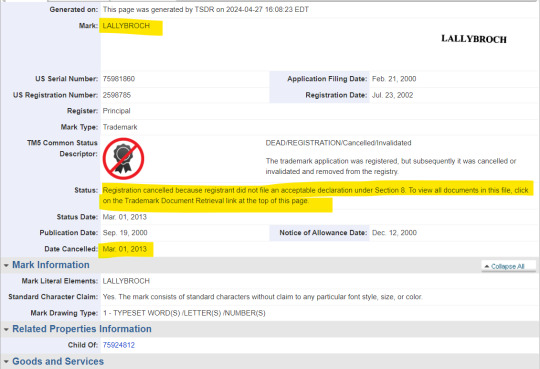
The reason is that the owner did not file the Section 8 declaration (of continuous use for five years) within the allowed legal timeframe (6 months after the fifth anniversary of the trademark granting renewal). Her trademark federal rights are now deemed canceled (but not her state law and/or common law rights!) and if she wants to ever use that name again, she would have to start the whole process over, bearing in mind the trademark could have been granted to someone else, in the meanwhile (not her case).
And for anyone who might ask, 'Erself does not own any other trademarks whatsoever:

The other (Doll Lab - LOL for ages) Diana Gabaldon is a pharmacist from Albuquerque, NM. Chill. 🤣🤣🤣
The owner of the copyright to the fictional toponym Lallybroch, as far as published text is concerned, is Diana Galabdon.
The owner of the copyright to the fictional toponym Lallybroch, as far as motion pictures are concerned, is Sony Pictures Television Inc.
The owner of the copyright to the fictional toponym Lallybroch, as a personal work of music, is Mrs. Kelly Ruth Davis, of Pennsylvania, USA.
The owner of the Lallybroch Spirits trademark will be Sam Roland Heughan, when that trademark is granted by the USPTO.
I hope this answers your question, @rosfrank. Thank you for asking.
112 notes
·
View notes
Note
a few quick questions on Machete, what breed is he? I love the angles of his snout and the proportions remind me of a borzoi though I don't think he is one. Also, does he have a set age for when he's a cardinal? I picture him to be around mid-30s or so. Wonderful art! love your stuff and find you an inspiration :)
He's a fictional breed called Podenco Siciliano, which is closely related to modern day Ibizan Hound (pictured below) and other Mediterranean rabbit-hunting podencos. I usually just default to calling him a sighthound since he's somewhat of a provincial mongrel and not meant to be purebred anyway.


As for the age, mid-30s sounds about right. I think the current timeline goes something like this:
0 - Born to a lower-middle class family in Sicily, father is a tradesman, has three older brothers. Generally considered a runt, is weak and sick all the time, parents suspicious of his unusual colors.
3 - Gets left at a monastery and raised by monks as a foundling. Nervous and meek kid, but the monks think he's endearing and do their best to support him. Is taught to read and write, which is a massive advantage at that day and age, and learns rudimentary Latin through exposure.
9 - Apprenticed to a Neapolitan priest, moves to southern part of mainland Italy (or Kingdom of Naples as it was called, it was ruled by Spain actually). Does chores and runs errands in exchange for education and experience.
15 - The priest gets elevated to a bishop and decides to sponsor Machete's further studies at an acclaimed university in Venice (in Northern Italy). There he studies theology, medicine, arts, law, philosophy and gets fluent in Latin and adequate in Greek. Befriends Vasco but their relationship is short-lived.
21 - Ordained a priest. Leads a parish somewhere in Papal States (Central Italy). Is generally well liked but doubts his career choice from time to time.
26 - Becomes a part of the Papal Court in Vatican, mostly because of the recommendations of his former mentor and professors, good reputation, excellent track record and sheer luck. Still a priest but assists bishops, cardinals and the pope himself directly. Moves to Rome. Becomes pope's unofficial confidant due to his obedient and hardworking nature and because of his lack of prestigious family connections that would render him a threat. Slowly starts to gain wealth.
30 - Created a cardinal (which is the second highest position in the church after the pope, and it's at the sole discretion of the pope who becomes one). Is also a bishop as a technicality. Handles administrative jobs, tons of paperwork, at some point he's in charge of a lot of the political correspondence and diplomatic missions. Still the old pope's trusted advisor but disliked by the majority of the cardinals, who see him as an outsider, sycophant and a potential disruptor of the status quo.
34 - Meets Vasco again. Vasco has become a succesful politician in Florence, he's married with three children.
38 - The pope dies and Machete's status falters. He starts to work with the Roman inquisition more. Oversees trials, torture, excommunications and executions of heretics, witches and most of all, protestants (since we're reaching Counter Reformation times and the Vatican is Very Worried about the spread of Luther's ideas). Isn't having a good time at all but keeps up the appearances. Gets infamous. The beginning of the true villain era.
40 - Grows increasingly more disillusioned with life and his ideals, as well as the corruption of the Curia. Burned out, paranoid and desperate. Uses scare tactics, extortion and legal trickery to expose and undermine his enemies, but gains them faster than he can keep up. Employs spies, thugs and assassins. Feared and loathed.
43 - Gets assassinated and dies in disgrace.
#answered#jaydenchapstick#sorry this turned out sorta long#and kinda bummer too#all of this is subject to change if I end up thinking of something better#not set in stone just the current grand picture#the ages are approximate#the history of Italy and the workings of the catholic church are both such clusterfucks holy moly gosh darn#I've done research but don't rely on my word that this is all accurate and feasible in the end it's fantasy rules#whenever you see him wearing any red it's a sign he's at the cardinal phase these positions are color coded like that#Machete
883 notes
·
View notes
Text

#cicero#classics#ancient romans#roman classics#roman history#marcus tullius cicero#Oratory#Rhetoric#classical civilisation#classical history#ancient rome#rome#Roman classics#Cicero's letters#Roman law courts#roman politics#Politics of the late republic#caesar#julius caesar#cato the younger#Verres#cicero the orator#Rome BC#history#Roman wars#Roman civil wars#marcus antonius#mark antony#roman oratory#roman rhetoric
69 notes
·
View notes
Text
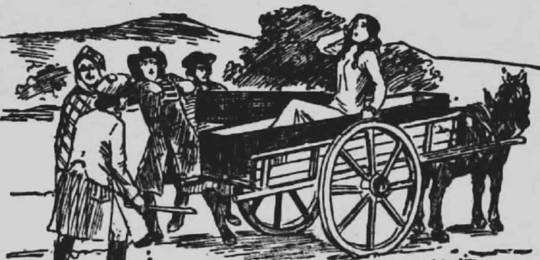

September 2nd 1724 Maggie Dickson climbed the gallows in Edinburgh's Grassmarket, ready to take “The last drop”
Her downfall came when she got pregnant and tried to conceal the fact. Maggie’s husband had deserted her to work in the Fisheries in Newcastle in Northern England.
Consequently she had to leave Edinburgh and moved to Kelso in the south of Scotland. Whilst there she had an affair with an innkeepers son.
As the Innkeeper was her employer she felt compelled to keep the pregnancy quiet as she would lose her job. Tragically the baby died after being born prematurely and she decided to dispose of the body. She intended to cast it into the River Tweed but instead left it on the riverbank. It was soon found and the authorities quickly determined that Maggie was the mother. At that time such an action in Scotland contravened the 'Concealment of Pregnancy Act' of 1690 which made it tantamount to murder.
"Her reason for concealing the birth of the child was for fear of being made a public example in the church, and a laughing-stock to all her neighbours The legal and religious institutions were severe on women concerning matters of their pregnancy. Even the natural occurrences of miscarriage or still-born infants could incur the wrath of the law.
And so it was, Maggie was tried, convicted and sentenced to hang. The execution took place on the 2nd September 1724 in the Grassmarket area of Edinburgh. This was the favoured location for hangings at that time and normally took place on market day to ensure a sizeable crowd.
Her body was then taken in a coffin for burial to the town of Musselburgh which was east of Edinburgh. Apparently this was only after an unseemly scuffle between her family and local medical students keen for a young body to dissect. The corpses of the condemned were regularly passed to the Schools of Anatomy in the name of science in the 18th century.
The family had their way and took possession of Maggie's remains for burial. They set off on the journey and on the way stopped off at a pub for some refreshments in the Peffer Mill area. All of a sudden there came a knocking and banging on the coffin lid from the inside. Astonished, they opened up the coffin to discover that she was not dead.
Miraculously it seemed that Maggie Dickson had not succumbed to the gallows but had cheated death at the hands of the law. She was alive and well as confirmed by a local gardener on the scene who cut a vein to check for a flow of blood. After spending a night to recover Maggie actually walked back to Musselburgh the next day.
But what would happen next? As the death certificate had already been issued it was impossible to re-execute Maggie. This was because Scots Law is based on Roman Pandects and in this case it prohibited further action. Therefore the King's Advocate could not pursue the matter any further.
Instead he filed against the Edinburgh Sheriff in the High Court of Justiciary for not efficiently conducting the public execution. The ruling also meant that as Maggie was technically dead then her marriage was dissolved.
Furthermore, the prevailing opinion amongst people in Edinburgh considered her survival to be the result of divine intervention. Local people believed it had been 'God's will' that had spared her from an early grave.
Rumours persist that she actually seduced the ropemaker and convinced him to make the noose weak enough not to kill her. We will never know if that's the truth.
Whatever the facts of her hanging Maggie lived for another 40 years and had many children. Her husband remarried her despite that fact that she now sported rope burns and her neck was permanently crooked for the rest of her life. She is said to have ran an alehouse in Musselburgh for the rest of her life.
If you have ever visited Edinburgh’s Grassmarket you will have no doubt seen the names of the bars have a historical connection, The White Hart connects with King David I and his encounter with a White Stag, The Last Drop is of course a nod to the execution place and Maggie Dickson is for our erstwhile subject today, who the people of Edinburgh remember as “ Half-hangit Maggie “
56 notes
·
View notes
Text
Knowing our Arcanists 4: Dikke
Welcome to entry four of my series: "Knowing our Arcanists"! This is a series in which I introduce and tell the stories of our fellow characters in Reverse: 1999. For today's character we have: Dikke!
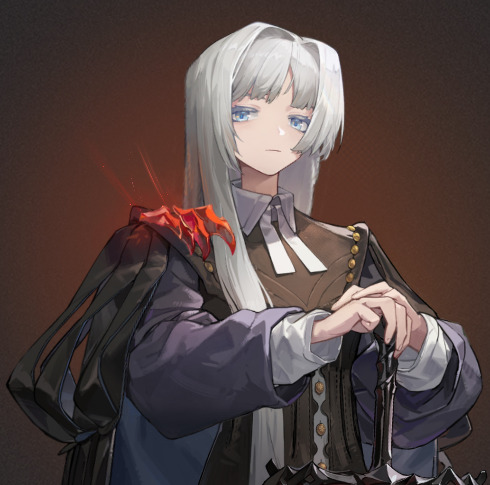
Ah one of the first characters hit by the yuri-beam that became very popular in the fandom for her being easily paired with other characters. Her character is pretty interesting, as being one of the vessels of justice and one of the oldest characters in the game. Just wish that her kit was as powerful as her canon, anyway lets get started!
Lady Dikke is a European arcanist coming from the middle ages, born on October 10th. She is the current magistrate and Supreme Chief of the Special Court, and is a very eccentric person who carries out justice in unconventional ways.
Her arcane skill involves an ancient Babylonian soul, who resides in the flaming sword "Justice" and is often depicted as a spiritual claw looming over Dikke's shoulder. While ferocious, it has been her guiding spirit when it comes to doing her job. She states that its sentient, being easily swayed by what it thinks is an injustice. Whether it'd be an action or some believed meaningless rumors, it will respond accordingly.
It can be assumed that this soul is likely based off of Babylonian King Hammurabi, as he is the creator of the law code that ultimately became the law code for others. The code, named after him, is one of the earliest, longest, and best-preserved legal texts made in the ancient Near East.
We don't know too much about Dikke as herself prior to her work, but when she grew older, she first became a chancellor in the (Medieval) Inquisition. Its power started to grow in Europe to carry out cases and trials in place of the secular courts, and when Dikke became bishop, it grew more powerful, gradually prevailing control over the courts and laws across the region.
The Inquisition also had some degree of control on handling the cases of arcanists, both innocent and guilty. While being viewed as cruel and abusive by some, it can't be doubted that it held a special place in the arcanum world. Dikke usually carried out some of these trials herself, providing justice for the guilty and giving mercy for those innocent.
Some time after the Black Death pandemic, Dikke visited one of the villages to investigate the death of a member of a church, conducting a long investigation that seemed unconventional but fully efficient to be able to reach a conclusion.
She found that all the townspeople (including the church) were guilty, as multiple factors led to the death of the church member and the case was silenced further before her arrival. However she carried out no punishment.
At some point, she went to the Roman Catholic Diocese of Pamiers in France, and became a magistrate and Supreme Chief of the Special Court there. During this time, she became in charge of conducting retrials of temporal court cases, to prevent wrongful convictions.
She used this to her advantage, as her control of this aspect led to many innocent arcanists to be saved from the witch hunts carried out by humans.
Dikke can be described as a very straightforward and active character, always making it a point to be fair and to be truthful. She never really lies, and continuously works towards carrying out the justice that guides her in every step she makes. Dikke is very insistent on it, and is often reluctant when it comes to accepting a position of power due to its connection with greed.
Despite these, she's not a stone cold person. She'll occasionally have a drink, make a humorous jab about the corrupt and the guilty, and enjoys quiet nights when the day ends with her goals fulfilled.
Dikke's belief in justice aligns with her layered empathy, but she is in no way to consider making an exception. She even tells herself that if she were to carry out an injustice that she too must deserve punishment. No guilty person can escape the blade of justice, neither will the wealthy and the powerful. Dikke will make sure of that.
#reverse 1999#knowing our arcanists#dikke#guys you won't believe who'll be up next after her#its hilarious
40 notes
·
View notes
Text
Turmoil; Chapter 1
Roman Roy x fem!Reader -read the rest here!
Prompt: slowburn romantic drama, arranged marriage plot line
a/n: thank you to anon for requesting! if you requested this fic, please tell me so I can tag you! I apologize if this reads as unrealistic or too dramatic- but please let me know your thoughts!
Word Count: 2.358k

Nothing. You’d turned yourself into something from nothing.
You’d ended up in New York on your own, running from your past, vying for a fresh start. With a degree from Harvard law in your pocket and an unsatiated hunger for success, it only took one case to change your fortune.
Your boss had pawned the case off on you because it seemed impossible. A man charged for real property fraud, and heaps of evidence to prove it. You initially thought you’d pawn the case off to some other schmuck, until you’d been given an anonymous tip and found a discrepancy in a bit of evidence that unraveled the opposition’s entire case.
It was a massive win- not just for you, but for your entire firm -and it came with a massive raise.
A few years later, you’d amassed an egregious amount of money in total and even more respect from those around you, so you quit and founded your own firm. You’re thankful for everything you have. You stay humble, you’re likable, and you make sure everyone in your employment is as well. It keeps you afloat- New York loves you, but more importantly, they trust you.
It earns you millions.
You’re happy with the life you lead. You frequent charity events, donating whenever you can, staying kind. You know what kindness can feel like during a period of misery. You remember what relief felt like when extended a hand, so you extend yours whenever you can.
You help the people around you. You’re kind to everyone, conduct yourself with grace, and are aware of yourself and those around you.
Maybe that’s why Logan Roy chose you.
He’d written to you a week ago, inviting you to dinner to discuss business prospects. You assume he’s gotten himself into a legal pickle involving some of his questionable activity which some regard as criminal.
When you enter the restaurant, one of his men spawn at your side and lead you into the dimly lit back where nobody is sitting. Your heels click on the marble, your gait not wavering.
“Mr. Roy,” you say when you see him. He gets up, albeit very slowly, and shakes your hand.
“Y/L/N in the flesh.” He sits back down and gestures to the seat across from him. You oblige. “You’ve made quite the name for yourself.”
“I do my best.”
He beckons over a passing waiter. “Get her whatever she wants. Put it on my tab.”
You quietly order a small appetizer and watch him watch you.
“Well, Mr. Roy, I hate beating around the bush. Why am I here?”
“The first case you worked on. Do you remember that man’s name? The one you proved innocent?”
“Connor Frost. I don’t forget. Never showed his face once.”
“About him. For witness protection and press reasons, we were allowed to alter his name in the official papers. We also got away with him never being there.”
Your heart misses a beat.
“Connor Roy was on trial for real property fraud, and you proved him innocent,” he continues. You school your face into neutrality. You get a sick feeling in your stomach that won’t stop growing and gnawing at you. It threatens to eat you inside out. “I hate to burst your bubble, but he was guilty. Fucking stupid, it was.”
You blink. “I don’t mean any disrespect, but-”
Logan’s eyes never leave yours. “But nothing. The deed you found in Connor’s name? Forged. And the people who forged it were paid more than enough to never think of speaking about it in court. You couldn’t have known it was fake, so you took it to trial and won. I practically bankrolled that raise of yours.” You can feel yourself begin to itch. “Initially, there was never any need to tell you. If I had things my way, I’d have let you live your life doing whatever the fuck you wanted. But my son had other plans.” As if he didn’t just reveal that your first case was a joke, he offers you some wine. You quickly decline. You feel like you’re going to puke all over him.
“Kendall. You know Kendall.” His voice drips with venom. “Would’ve given everything to him, but he obviously has different ideas for the company. I can’t let him take it now. He’ll fuck up everything I’ve worked for and put into place at Waystar. And I’m not giving the company to the idiot who accidentally committed fraud to the point of felony, or the one who’s running around the world with her dumb fucking political bullshit. That leaves me with one son. So the company has to go to him.”
Logan tops off his glass of wine. “But, by God’s grace, this leftover son is the fucking stupidest of them all.”
You have no idea how this has anything to do with you.
“Let me be clear, Miss Y/L/N. I respect you. You’re a fantastic attorney. I’d have you on retainer- I will, once my current contract with that Frederica jackass runs out. But you must forgive me for all of this. I have to do what needs to be done.”
He inhales, then sighs. “For you to take control without me losing public face, I want you and my son to come to an agreement in a partnership.”
You have to give him the dumbest fucking look for him to respond with, “Marry him. I need you to marry him.”
“I’m sorry?” You can barely keep your composure. You think you’re dreaming, or someone spiked your water, or you’re dead, or anything but this.
“I can’t have him in control. I can pretend like he is, sure, but I need someone with a brain at the helm.”
“I… my degree is in criminal law. I have no idea how the corporate, let alone financial world runs.” It’s all you can think of to say.
He waves you off. “You’ll learn.”
You don’t know what to say. You probably look like a fish, mouth hung open as you gape at him. “Surely someone else is better suited to this than me. I won’t. I can’t.”
“This is why I had to apologize,” he mutters. “Do as I say, and our secret is kept. Walk away, the tabloids will learn of a little lady who buried and forged evidence to win her first court case.”
“You can’t be serious. I thought it was real!”
“The public doesn’t know that. Regardless, I’ve done worse. I’ve ruined stronger, more powerful people with much less.”
You press your lips into a thin line. “I suppose you’ve left me with no choice,” you grit out.
Logan smiles and claps his hands together. “Welcome to the family.” Your appetizer finally comes and is set in front of you. You don’t feel that hungry anymore. “What are you waiting for? Eat!”
He takes a bit of calamari from you. “I think it goes without saying,” he says, “that if you say anything about this conversation we’ve had, you’ll end up prosecuted and in jail for fraud.”
☾𖤓
You feel like you could punch a hole into the wall. You can’t believe it. It’s pure dumb fucking luck that you got caught in this.
Logan Roy didn’t choose you for your legal prowess, or any of your skill or ability like you’d stupidly believed. He chose you because he has control over you, and he knows it.
A few days pass, and you begrudgingly drag yourself out of your rotting place in bed. Cursing yourself the entire time, you change into something nice. Logan told you he was throwing a party in your name, to introduce you to the family- and the inner circle, you knew.
If anything, you think to yourself, you look fucking good.
You’re not prepared for the onslaught of paparazzi that bombards you the moment you step out of the house.
That bastard must’ve told the press about your engagement.
There’s nothing you can do but get into the black sedan waiting for you at the bottom of your driveway. You’re probably going to have to move, now.
You sit in the backseat, simmering the entire drive. You have to prepare yourself for the hell that’ll be stiff arming paparazzi to get to the party.
When you pull up, you take a deep breath, and step out the car. The man sitting in the passenger seat got out before you and walks out in front of you, another flanking you as you push through the chaos.
The flashes are almost blinding, but you keep your eyes open. Every picture taken tonight is going to be circulated tenfold by not even tomorrow morning. You hope you have resting bitch face in all of them.
Your miniature guard manages to get you inside with no issues. You’re late on purpose, and it seems like the room goes quiet when you enter.
The crowd stares back at you as you survey them. As much as your rage is telling you to make a scene, you won’t. Time and place, you tell yourself.
Immediately, you can tell Connor recognizes you. He tries to avoid your gaze, but your rage bubbles up and out of you. “Mind if I steal him for chat?” you ask the girl standing with him, voice painfully faux-sweet. You feel like you’re on Love Island, in some sick, twisted way.
The girl gives Connor an awkward pat on the arm before leaving him be. You can feel peoples’ eyes burning into the back of your head.
“You told me,” you begin, voice dangerously low, “that you didn’t do it.”
He looks everywhere but at you. “I was just doing what I had to.”
“Was fucking me over what you had to do? Because I feel like that’s all you did,” you hiss.
“Do you really think someone like me is going to ever go to jail?” Connor scoffs. “It could damage my reputation.”
“It could damage my reputation,” you mock. “Are you fucking stupid? Fucking God.”
You turn to leave, but immediately pivot back. “You’re a Roy. You would’ve been bailed out immediately. You wouldn’t have even gone to jail for an hour.”
You’re fuming. You’re barely holding it together.
Then, you catch the eyes of a man not that much taller than you, dressed in all crisp black. He’s handsome, you think, a light stubble dotting his jaw and soft eyes that wrinkle gently when he smiles.
He excuses himself from the conversation he’s having to come to you and Connor.
“Connor. You’ve met my lovely bride-to-be?”
You’re back to fuming, any thoughts of his beauty gone.
He sticks his hand out to you. “Roman Roy. Nice to meet you, I’m your fiancé.” His voice is painfully bitter.
“You think I want this any more than you do?” you ask under your breath, your handshake way too firm. His grip on your hand is equally as tight.
Connor snorts. “At least act like you like each other.”
“You’re the reason any of this happened. Keep yourself out of it,” you snap.
Roman sighs and turns away from Connor. “Can we go for a walk? We should probably have a word.” To your dismay, you agree.
As soon as you’re out of the main atrium and by yourselves in a grand hallway, you speak freely. “Listen, this is nothing personal,” you begin, “but I’m looking for a way out of this.”
Roman looks over at you as you walk, both of you going at a snail’s pace. “I don’t stink, do I?” He sticks his hands in his pockets. “For what it’s worth, I’m sorry this happened to you. I know he’s blackmailing you.”
You sigh. “I should’ve known something was wrong with the case when I never saw my fucking client in person.”
“Well, I want this over as quickly as you do. My father doesn’t want me anywhere near the company, and I’d like to change that.” You both stop walking to face each other. Maybe you two can be friends, despite everything.
“Let me make something clear, though.” Roman takes a step towards you, leaning forward to whisper in your ear. “I’m only in this for me. Not you.”
Whatever positive thoughts you’d had were chased away. You spend the rest of the night fuming under your skin, lying through your teeth, and standing by yourself in the corner.
Siobhan Roy is the first to approach you.
“I admire you, you know.”
“Your father said that too, and look where I am now.”
She presses a flute of champagne into your hand. “I’m not my father.” You share a tense look. “Listen. I think we can do something good together,” she says lowly. “You want to disentangle yourself from this situation, and I want my father out of the picture when it comes to Waystar. Some of my clients have used your firm during political scandal. They all came away unscathed… I have full trust in your ability.”
“What do you want from me?”
“When the time comes,” Siobhan says, “I want you to help take my father to court. And put him down under. So to speak,” she adds. “And I’ll help make sure that if my father ever says anything about you, nobody believes it.”
After Siobhan, it’s Kendall.
“Shiv talked to you.” He’s worse at keeping conversation than she is. “I would also be involved in this. I’d take my dad’s place as CEO, Roman becomes COO.”
“I take him to court, I’m told.”
“Yeah. Yeah, you do, and you win,” he says carefully. “And then you get so much money you can run away to some foreign country and forget any of this happened.”
You regard him carefully. “How can I trust you? Or Siobhan? Or anyone in this fucking place?”
Kendall pauses, and takes a moment to think. “You can’t,” is all he says before leaving you standing on your own once again.
Finally, Roman makes his way back to you. You bristle as you watch him approach. “I know you don’t really like me right now, but I want to go home and I can’t leave without you on my arm. So, shall we?”
You roll your eyes, but take his elbow anyway.
#roman roy#roman roy x you#roman roy x reader#succession#succession hbo#succession fic#succession x reader#slowburn#roman roy slowburn#romantic drama#succession slowburn#x reader slowburn#wambsgansshoelaces#turmoil
197 notes
·
View notes
Photo

A Roman Boy's Rite of Passage
A Roman boy's rite of passage, a ceremony or ritual marking a transitional period in life from childhood to adulthood, was the assuming of the toga virilis, the adult toga. The ceremony usually took place sometime between the boy's 14th and 17th birthday; the decision was made by the boy's father or guardian.
Young Marcus Aurelius
Ramon van Opdorp (CC BY-NC-SA)
The ceremony is referenced widely across historical writings, biographies, letters, and speeches, however, the ancient primary sources available to us do not provide too many details. There is in general a scarcity of ancient material written about children, and we certainly have more information regarding the lives of the middle-class and elite families than we do of the lower classes, and a boy's rite of passage is no exception.
Timing
A boy's rite of passage would have corresponded with puberty, a time defined by some ancients as a period of 'ferocitas', that is, impetuosity or restlessness. The physical transition from a boy to a young man was marked by several features including the 'breaking' of his voice, which was known as 'gallulascere' (crowing), and by the growth of facial hair. At 14, a young boy may have had the first growth of a beard; this first growth was associated with adolescence and visually marked out the young boy from the adult male. This growth was allowed to become a full beard and was not shaved off until the boy was in his late teens to early twenties. When finally the shaving of the beard occurred, it was seen as the end of the wayward youth and a progression into a more adult life. The shaving of the beard could sometimes be carried out at a public festival known as the Iuvenali; at this festival, the young man's beard was dedicated to a god of his own choosing and kept in a small box in the sanctuary of the family's household gods.
A boy in his early teens was still under the supervision of his pedagogue, who would also have accompanied him outside of the home. Roman education for a youth from the affluent or elite society, would have included rhetorics, oratory, law, politics, astronomy, geography, law, literature, philosophy, and mythology. Some boys may have been considering leaving home to advance their education; there were Roman students in Athens and the other intellectual centres of the Eastern Mediteraneann. In many cases, they would have been accompanied abroad by their pedagogue.
By the time Roman boys had reached the age of 14, many fathers would have already been taking their sons to observe life in the Roman Forum, they would have attended public meetings and the Roman law courts, and sons would have been introduced to their father's friends and business acquaintances. The foundation for a boy's transition into adulthood and what it might entail was being laid. Young boys would have been under patria potestas and would have remained under the power of their fathers until their father's death; no coming of age or rite of passage liberated sons from this position.
Nevertheless, the ceremony of assuming the toga virilis was a defining moment in a boy's life. The decision of what age a boy was ready for the rite of passage and to be enrolled as a citizen was taken by his father or guardian, but the ceremony tended to happen between a boy's 14th and 17th birthday. The statesman, Marcus Tullius Cicero (106-43 BCE), marked his coming of age at 16, his son Marcus at this age, too, while the first Roman emperor Augustus (l. 63 BCE to 14 CE), as a young Octavian was just 15 years old, and Emperor Marcus Aurelius (l. 121-180 CE) assumed his toga at 16. A popular day chosen for this significant event in the life of the boy and his family was the 17th of March, at the festival of Liber, although other dates were equally acceptable.
Continue reading...
40 notes
·
View notes
Note
What’s the case for an upper and lower chamber?
In my opinion, none.
The historical situation is that the upper chamber had more power and the lower was a sop to the common folk and petty nobility: this is why the House of Commons was formed (originally from knights of the shire and the representatives of cities that had been granted special rights by the Crown), and only later, after a very long process of constitutional evolution in Britain, did the Lords transform into a consultative body that was adjunct to the Commons, where the real power lay. For a while, even after you started to have something that looked like modern government in Britain, you still frequently had PMs drawn from the Lords--and still could, in theory, except that the convention is they come from the Commons.
In the U.S. example, the goal was simply to split the difference between a popular chamber (the House) and a chamber representing state governments (the Senate, whose members could be chosen by any method provided for under state law, but originally were usually chosen by state legislatures). This is because the people who drafted the U.S. constitution hated and were suspicious of popular democracy, because they were rich landowners and slaveholders whose positions were untenable in the long run if everyone in the country could vote and was equally represented.
Obviously they didn't put it like that--they spoke of the hotheaded hoi polloi, the changeable will of the people--but they were massive Romeaboos, and all the populist leaders who whittled away at the Roman republic managed to do so because they were willing to centralize power, to take it away from the baronial elite of the Republic, and to use that power in service of people further down the org chart. In service of themselves too, of course--these were not altruists--but it was the particularly Roman instantiation of the crown-vs-barons struggle, where the common folk usually side with the Crown, because the barons are bastards who abuse them directly.
(Very many "tyrants" in history were "tyrants" only in that they gave a raw deal to the barons in their particular social order, and very many events which we now describe as movements toward a more equitable distribution of power were in fact a very shitty deal for the majority of the population--the peasants--because it gave the barons even more license to abuse their serfs.)
And the American founders knew all this, and they were all barons, and they didn't like the idea of a federal government that was too effective, so they sprinkled it with veto points and also totally failed to anticipate the rise of modern political parties. (Which weren't exactly what they had in mind when they warned against factionalism--that was more about sectional interests. But still, they did totally fail to anticipate how this system would work as party politics developed.)
In a system of democratic government like the U.S. has now, where it is widely acknowledged the rule should be "one adult citizen never convicted of a felony who can get the day off work to stand in line and has a photo ID = one vote" the U.S. Senate is an inexcusable anachronism. Indeed, the Supreme Court has ruled that state senates modeled on the exact same principle as the U.S. senate (say, one county one senator, as the constitution of my home state Tennessee has it) are unconstitutional, because they violate the equal protection clause.
More recently, many countries have approached the idea of an upper chamber as a sort of "chamber of experts" meant to review and advise on legislation. This kind of makes sense in theory, I guess, but if voters want subject-matter experts to make policy, they can vote them in; in practice, any system of appointment or ex officio qualification is going to select for political lackeys without democratic mandates, and it's also just a bad idea to have people with significant power over the legislative process who do not have democratic accountability. The problem of creating legislation is never that we don't have enough smart people willing to offer their opinions; the problem is brokering functional compromises between interest groups and resolving incentives that push the process toward dysfunctional outcomes, which isn't really something you can fix just by fiddling with the composition of your upper house.
So in most modern parliamentary democracies, upper houses are reduced in power. Either they can't veto bills permanently (Lords), they can't originate money bills (Lords again), they only have input on certain matters (German Bundesrat), they're full of government appointees to ensure the government always has a majority in them (Irish Seanad), or the lower house can overrule them on most matters (Japanese House of Councillors). And the reason why is obvious: if your democratic mandate comes from the lower house, if that's where your government is being formed in a parliamentary system, if the whole principle of government is meant to be collective self-rule by the body of citizens, an upper house that is a check on that power is either definitionally redundant or a brake on democracy.
There are ways to ensure that a lower house is both representative and does not devolve into factional chaos. Proportional representation, four-year terms, constructive motions of no confidence (again, parliamentary systems only), etc. Plenty of countries and subnational entities have unicameral legislatures and are perfectly stable: Sweden, Norway, the Baltics, Portugal, Mongolia, South Korea, Peru [ok bad example nvm], all the states of Germany, all the provinces of Canada, most of the provinces of Argentina, Queensland, the vast majority of the states of India, and the three devolved legislatures in the United Kingdom.
Therefore in my opinion there is no good democratic case for an upper house. And all the undemocratic reasons why you'd want one are bad. Too much democracy is, in fact, a very rare problem for systems of government to have!
119 notes
·
View notes
Text


The Restoration of the Roman Republic ... in the Middle Ages? The Forgotten Commune of Rome
Today it seems men often have Rome on their minds with Tik Toks and polls indicating that men often think about Rome on a daily basis. I'm assuming that most of these thoughts revolve around the Roman Empire, lesser so the Roman republic, some the Eastern Roman (Byzantine Empire), and few think about the Roman monarchy. However I guarantee that almost no one thinks about the medieval Roman Republic known as the Commune of Rome.
In the 12th century central Italy was directly ruled by the Pope through the Papal States. One of the hot topic political issues of the day was the "investiture controversy", which was debate over who had the power to install bishops and other important clergy; the Pope or secular authorities. This evolved into a debate on who would have ultimate governing authority, the Pope, or the secular government, most notably the Holy Roman Empire. At the time, many cities in Italy were growing disgruntled with the rule of the Pope and the rule of nobles who supported the Pope. This resulted in popular uprisings in which cities overthrew the Papal government and declared themselves independent, thus forming various city states and communes in Italy.
In 1143 a wealthy Italian banker named Geordano Pierlione led a revolt against Papal authority, kicking the Pope out of Rome and declaring an independent Commune of Rome. The next year a monk and priest named Arnold of Brescia arrived in the city, becoming the intellectual leader of the movement and establishing the new Roman Republic. Arnold was a controversial reformer who railed against abuses of Church and Papal authority, decried Church corruption, and advocated a thorough reformation of the Church. Among his ideas he believed that clergy needed to return to apostolic poverty, renouncing all wealth and ownership of property, and also renouncing secular political power. Here's a statue of him in Brescia, Italy today.

With Arnold at it's head a new Roman government was formed and modeled after the ancient Roman Republic, with 56 senators who were not of noble class, 4 from each of Rome's medieval districts, and executive authority invested in a "patrician". The new republic refused to use the title "consul" as it had become an inherited noble title after the fall of the Western Roman Empire. Nobles and aristocrats above the rank of knight were not allowed and thus most noble titles were abolished.
Of course the Pope, then Lucius II, was not going to tolerate such a rebellion and attempted to take back the city. In 1145 he formed an army and laid siege to the city. Amazingly the Romans drove away the invaders, with Pope Lucius II being killed in the battle after being bonked in the head with a rock.
The new republic flourished; drafting news laws, reforming medieval Roman society, making alliances with other Italian city states and war with others, setting up courts, and minting coins.
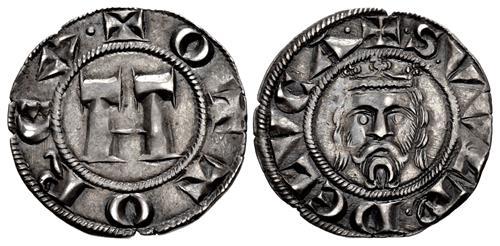
The Roman army was reformed, and a new capital building was constructed on the Capitoline Hill known as the Palazzo Senatorio (the Senate Palace), which still stands today but is much different after being heavily renovated by Michelangelo in the 1530's.
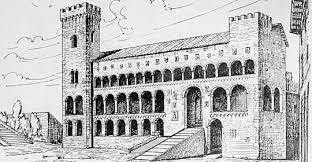
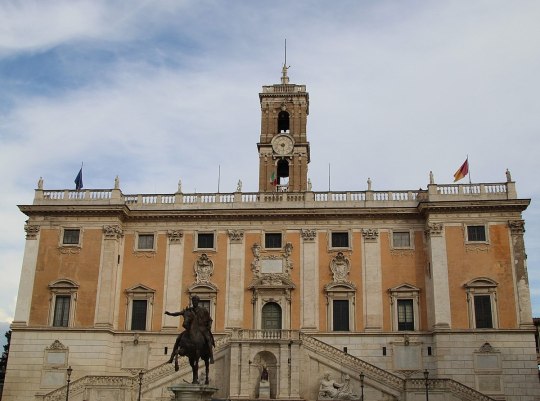
Originally the new Roman Republic swore fealty to the Holy Roman Emperor. However Rome and the Empire had a falling out. In 1149 the Roman Senate invited the German king Conrad III to the city to be coronated Roman Emperor. Rome's enemies were growing, so the Roman Senate offered Conrad this title in return for protection. Conrad had already been elected as Holy Roman Emperor and was due to be coronated, but the Roman Senate was proposing that he be THE Roman Emperor, as in like, a real Roman Emperor whose authority is defined by the Roman Senate, and not a Holy Roman Emperor whose authority was defined by the Pope and a loose confederation of high ranking German, Italian, Austrian, and Czech nobles. In the Holy Roman Empire the emperor is elected by the highest ranking nobles of the land. The Roman Senate was claiming that it had the authority to choose Roman emperors as the senate did during the ancient Roman Empire. Well, lets just say that Conrad probably didn't take too kindly to the Roman Senate attempting to usurp the governing structure of the Holy Roman Empire. In the middle ages a group of lower class burghers and knights cosplaying as Roman senators was not a good basis for a Europe spanning universal imperial monarchy. When Conrad died he was already cutting a deal with the Pope to snuff out the republic.
Conrad died in 1152 but his successor, Frederick Barbarossa continued the deal with the Pope to end the Roman Republic. It was one of the few times Frederick and the Pope agreed on anything. In 1155 a combined Papal/Imperial army invaded Rome. The city quickly fell and Arnold of Brescia was captured and burned at the stake. His ashes were scattered into the Tiber River.
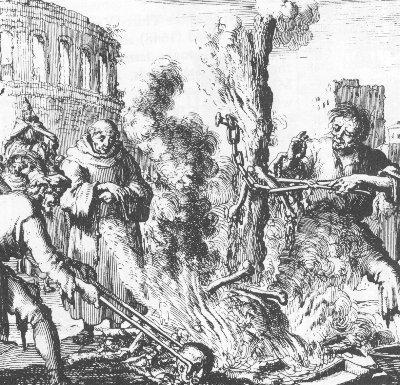
Amazingly the Roman Republic lived on. Frederick Barbarossa was coronated by Pope Adrian IV as Holy Roman Emperor, an act which led to a new revolt among the Romans. Frederick put down this revolt, killing 1,000 Romans in the process, but afterwards he simply left the city and never returned after becoming bogged down in the complex politics of Italy. The Pope also left Rome, having to deal with a papal schism, resulting in no one being left in charge of the city and thus another restoration of the Roman Republic.
In 1167 Rome made war on the neighboring city of Tusculum, a long time rival of Rome who had supported the Pope and became a papal capital after the foundation of the republic. The Count of Tusculum appealed for help to the Holy Roman Empire, and Frederick I sent a small army of 1600 men. The Romans had an army of 10,000 made up of peasant militia who were poorly armed and poorly trained. While heavily outnumbered the Imperial army consisted of well armed and trained knights and professional soldiers. The Imperial army easily defeated the Romans at the Battle of Monte Porizio on May 29th, 1167, a battle which would later be called, "the Cannae of the Middle Ages". The Imperial army would continue to march on Rome, but by a stroke of luck for the Romans would be struck with the plague and forced to turn back. The Romans got their revenge against Tusculum in 1183 when they conquered and burned the city to the ground Carthage style.
The beginning of the end of the republic came in 1188 when Pope Clement III made a power sharing deal with the senate in which the people would elect senators but the Pope would have to approve the senators. The senate agreed to this in order to secure the protection of the Pope as the Holy Roman Empire was still a threat. Over the coming decades popes would reduce the number of senators until by the early 13th century, there was just one. Soon that single senate post was directly chosen by the Pope, and eventually it became a hereditary position. Before you knew it, French and Spanish nobles were becoming Roman senators and Roman senators ruled as autocrats at the behest of the Pope. By the end of the 13th century, the Roman Republic was dead.

211 notes
·
View notes